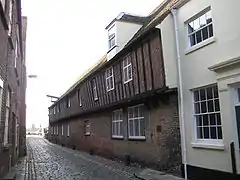Kontor
A kontor (English: /kɒnˈtɔːr/) was a foreign trading post of the Hanseatic League.


In addition to the major kontore in London (Steelyard),[1] Bruges, Bergen (Bryggen), and Novgorod (Peterhof), some ports had a representative merchant and a warehouse.
Etymology
Through Middle Low German Kontor, from French comptoir, from Latin computāre 'calculate, compute'. After spreading via the League, the word kontor continues to mean 'office' in the Scandinavian languages and in Estonian, while kantoor is used in Dutch. Probably from Dutch, and quite possibly thanks to Peter the Great, the word, as контора (kantora), is also one term for 'office' in Russian and Ukrainian. The latest word for 'office' in Russian is офис (ofis).
Archaeology
Of all the kontor buildings, only Bergen's kontor, known as Bryggen in Norway, has survived until the present day. The Hanseatic kontor at Bryggen was closed in 1754 and replaced by a "Norwegian kontor", run by Norwegian citizens, but still with a large element of German immigrants. Bergen's kontor is on the UNESCO list of the World Cultural Heritage sites.[2]
The Hanseatic Warehouse in King's Lynn, England, survives – but was converted into offices in 1971.


